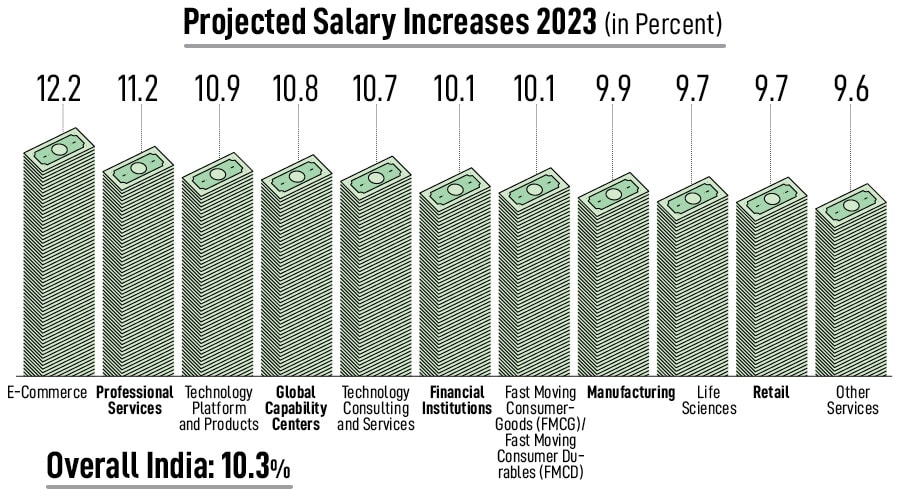Salaries in India expected to increase by 10.3 percent in 2023: Aon Survey
Though slightly lower than last year's 10.6 percent, the projected hike continues to be in double digits despite concerns about economic volatility


Salaries in India are expected to increase by 10.3 percent in 2023 compared to an actual increase of 10.6 percent in 2022. Although slightly lower than last year, the projected increase continues to be in double digits despite concerns about economic volatility. At 21.4 percent, the attrition rate in India for 2022 remained high. According to global professional services firm Aon, this is a consequence of an ever-changing talent strategy, and the ongoing gap between supply and demand of talent.
Aon’s latest ‘Salary increase survey’ suggests that rising inflation and persistent attrition continue to be key concerns for organisations, and contribute towards high salary increases. “The ‘great resignation’ has been followed by the trend of ‘quiet quitting’. A considerable proportion of employees are disengaged. Organisations are therefore facing a challenge in not only retaining talent, but also driving productivity from existing employees," explains Roopank Chaudhary, partner, Human Capital Solutions, India at Aon.The current trend mirrors the last such phase of high attrition seen in 2011 where attrition stood at 19.8 percent.
The study also suggests that there is no imminent recession in India, but growth is moderating. The fundamentals of the economy remain strong with 50 percent companies anticipating over 10 percent business growth. Also, the number of companies reporting a business decline has come down.
Almost one-fourth of the total salary increase of 10.6 percent is ring-fenced for non-merit increases. The survey further reveals that while the merit increase projections—increase based on individual performance—stays steady at 7.8 percent, the non-merit salary increase projections—increases on top of merit increase, such as market corrections, special adjustments and promotions—is expected to moderate to 2.8 percent, which is higher than the historical average. This is particularly noteworthy at junior levels where the non-merit increase projections are as high as 3.3 percent.

The non-merit salary increase projections continue to be moving up as firms’ budget for retaining talent goes up through promotions and off-cycle corrections, explains Pritish Gandhi, Aon director & India Practice Leader, Executive Compensation & Governance. “As companies look to differentiate and optimise their talent spend, employers are investing more for critical talent in key roles. While it is important for businesses to define and adapt pay increases for both merit and non-merit factors, organisations must take a strategic approach to total rewards to build a resilient workforce and shape their strategies towards long-term drivers of pay and performance."
The dynamics of talent, costs and margin pressures vary significantly across the different cohorts of the tech sector. While a cautious climate of austerity exists across the cohorts, enterprises seem to have sharpened their performance, rewards and recognition models, according to Kamal Karanth, co-founder of specialist staffing company Xpheno. He further adds that the tighter performance monitoring and increment structuring is one of the aftereffects of the expensive hyper-hiring done by IT in 2021 and early 2022.
“The demarcation between the superstars, the finishers and the also-rans has been repainted and it’s being used to decide the increments bandwidths. Superstars, who make 20 percent of an enterprise, may receive up to 20 percent hikes, while the also-rans, on the other hand, may qualify for increments much below a typical inflation correction. The key cohorts in the tech sector like services and products are hence set to see increments in the 6 to 11 percent range," Karanth tells Forbes India.
Aon’s survey which analysed data across 1,400 companies from more than 40 industries also found that India has the highest salary increase among large nations, and has outpaced all developed and fast-growing economies.
First Published: Feb 23, 2023, 15:37
Subscribe Now